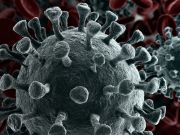WEDNESDAY, July 22, 2020 (HealthDay News) — Hopes for robust, long-term antibody protection after a bout of COVID-19 have been dampened by a new study that finds the protection may only last a few months.
Still, experts noted that the body’s immune system has more than one way to defend against viruses it has already encountered, so the findings don’t dash hopes for a vaccine.
“Infection with this coronavirus does not necessarily generate lifetime immunity,” Dr. Buddy Creech, an infectious disease specialist at Vanderbilt University in Nashville, told the Associated Press.
But antibodies are only part of the immune system’s armamentarium, added Creech, who wasn’t part of the new research.
The study was published July 21 in the New England Journal of Medicine. Researchers led by Dr. Otto Yang, of the University of California, Los Angeles, sought to determine the “half-life” of antibodies generated by contact with the new SARS-CoV-2 virus. Half-life means the time it takes for half of the antibodies to disappear.
Yang’s group took blood samples from 34 people who had all recovered from a mild case of COVID-19. Twenty were women and 14 were men, and they averaged 43 years of age.
Based on blood tests collected up to 119 days after the onset of symptoms, the researchers said the half-life of antibodies linked with SARS-CoV-2 infection was just 36 days — just over a month. At that rate, antibodies would disappear completely in about a year.
It’s an “antibody loss [rate] that was quicker than that reported for SARS-CoV-1,” the coronavirus responsible for the 2003 SARS outbreak, the researchers noted.
“Our findings raise concern that humoral [found in body fluids] immunity against SARS-CoV-2 may not be long lasting in persons with mild illness, who compose the majority of people with COVID-19,” they said.
“Like the common cold-causing coronaviruses, the new coronavirus does not appear to provide durable antibody-based immunity for a long period of time,” said Dr. Amesh Adalja, a senior scholar with the Johns Hopkins Center for Health Security in Baltimore.
But that doesn’t mean that immunity necessarily is gone, he added, since the human immune system has other tricks up its sleeve.
“It still remains to be seen whether these individuals can be reinfected and, if so, what that clinical course is like, as T-cell immunity is also an important factor to consider,” said Adalja, who wasn’t involved in the new study.
T-cells are a distinct component of what’s known as the adaptive immune system. They help fight infection in many ways, including directly killing infected cells.
For his part, Creech agreed that just because antibodies to SARS-CoV-2 have a relatively short half-life doesn’t mean people lose the ability to fight off recurrent infection.
He explained to the AP that antibodies are proteins produced by immune system B cells to help recognize and destroy cells infected with a virus. When a new virus is first encountered, more generalized forms of antibodies are quickly produced, but their specificity against the virus gets increasingly precise as time goes on.
The B cells also develop a kind of memory as to how to generate these precise antibodies if the virus appears in the body again.
“They would get called into action very quickly when there’s a new exposure to the virus. It’s as if they lie dormant, just waiting,” Creech said. T-cells also lie in wait, able to mount a separate battle against infected cells, he said.
And what about hopes for a vaccine?
Efforts to find an effective vaccine are still valid, Creech said, because a vaccine’s highly targeted approach against viruses actually exceeds that of the natural immune system.
“This shouldn’t dissuade us from pursuing a vaccine,” Creech said. “Antibodies are only a part of the story.”
More information
For more on how the immune system works, see the U.S. Library of Medicine.
Copyright © 2025 HealthDay. All rights reserved.

